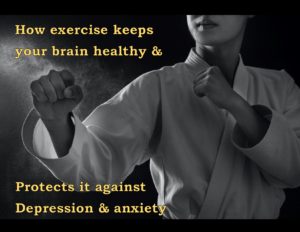
As with many other physicians, recommending physical activity to patients was just a doctor chore for me – until a few years ago. That was because I myself was not very active. Over the years, as I picked up boxing and became more active, I got firsthand experience of positive impacts on my mind. I also started researching the effects of dance and movement therapies on trauma and anxiety in refugee children, and I learned a lot more about the neurobiology of exercise.
I am a psychiatrist and neuroscientist researching the neurobiology of anxiety and how our
interventions change the brain. I have begun to think of prescribing exercise as telling patients to take their “exercise pills.” Now knowing the importance of exercising, almost all my patients commit to some level of exercise, and I have seen how it benefits several areas of their life and livelihood. We all have heard details on how exercise improves musculoskeletal, cardiovascular, metabolic and other aspects of health. What you may not know is how this happens within the brain.
Brain biology and growth
Working out regularly really does change the brain biology, and it is not just “go walk and you will just feel better.” Regular exercise, especially cardio, does change the brain. Contrary to what some may think, the brain is a very plastic organ. Not only are new neuronal connections formed every day, but also new cells are generated in important areas of the brain. One key area is the hippocampus, which is involved in learning and memory and regulating negative emotions.
A molecule called brain-derived neurotrophic factor helps the brain produce neurons, or brain cells. A variety of aerobic and high-intensity interval training exercises significantly increase BDNF levels. There is evidence from animal research that these changes are at epigenetic level, which means these behaviors affect how genes are expressed, leading to changes in the neuronal connections and function.
Moderate exercise also seems to have anti-inflammatory effects, regulating the immune system and excessive inflammation. This is important, given the new insight neuroscience is gaining into the potential role of inflammation in anxiety and depression.
Finally, there is evidence for the positive effects of exercise on the neurotransmitters – brain
chemicals that send signals between neurons – dopamine and endorphins. Both of these are involved in positive mood and motivation.
Exercise improves clinical symptoms of anxiety and depression
Researchers also have examined the effects of exercise on measurable brain function and symptoms of depression and anxiety. Exercise improves memory function, cognitive performance and academic achievement. Studies also suggest regular exercise has a moderate effect on depressive symptoms even comparable to psychotherapy. For anxiety disorders, this effect is mild to moderate in reducing anxiety symptoms. In a study that I conducted with others among refugee children, we found a reduction in symptoms of anxiety and PTSD among children who attended eight to 12 weeks of dance and movement therapies.
Exercise could even potentially desensitize people to physical symptoms of anxiety. That is because of the similarity between bodily effects of exercise, specifically high-intensity exercise, and those of anxiety, including shortness of breath, heart palpitation and chest tightness. Also, by reducing baseline heart rate, exercise might lead to signaling of a calmer internal physical environment to the brain.
It is important to note that the majority of studies examined the effects of exercise in isolation and not in combination with other effective treatments of clinical anxiety and depression, such as
psychotherapy and medication. For the same reason, I am not suggesting exercise as a replacement for necessary mental health care of depression or anxiety, but as part of it, and for prevention.
There are other perks besides the neurobiological impacts of exercise. When going out for a walk, one gets more exposure to sunlight, fresh air and nature. One of my patients befriended a neighbor during her regular walks, leading to regular taco Tuesdays with that new friend. I have made some great friends at my boxing gym, who are not only my motivators, but also a great supporting social network. One might pick a dog as their running mate, and another might meet a new date, or enjoy the high energy at the gym. Exercise can also function as a mindfulness practice and a respite from common daily stressors, and from our electronic devices and TV.
By increasing energy and fitness level, exercise can also improve self-image and self-esteem.
Practical ways for a busy life
So how can you find time to exercise, especially with all the additional time demands of the pandemic, and the limitations imposed by the pandemic such as limited access to the gyms?
Even if you do not feel anxious or depressed, still take the exercise pills. Use them for protecting your brain.
By Arash Javanbakht, Associate Professor of Psychiatry, Wayne State University.
Originally published on “The Conversation” under a Creative Commons license. Please follow the link below to go to the original article:
Comments are closed.
Copyright © Broadway Family Karate 2024 Design by The Visibility Method